The Aruna Jagadeesan Commission’s final report recommended ₹50 lakh for each bereaved family and ₹10 lakh for those who sustained grievous injuries. The recommendation, however, is not implemented.
Published Aug 23, 2025 | 10:00 AM ⚊ Updated Sep 12, 2025 | 11:33 AM

A picture from 22 May, 2018, when the anti-Sterlite protest turned violent. (Creative Commons)
Synopsis: The case continues to be heard in the Madras High Court and the Supreme Court. Yet, no district collector, government official, or police officer connected to the incident has ever been arrested or made accountable. Instead, they were transferred to other postings — some even received promotions.
Seven years have passed since the Thoothukudi firing that claimed 12 lives. Justice, however, still eludes the martyrs.
“Is our life worth less than that of a crow or a sparrow? Even if someone shoots a crow or a sparrow, there is a law to protect it. If someone beats a dog, the police will arrest them,” J Vanitha, whose son J Snowlin was among those killed, said.
“We have been living in tears and suffering for the past seven years. What law has this government ever passed for us?” she asked as her voice broke.
Sterlite Copper, a smelter plant run by Vedanta’s subsidiary, is located inside the SIPCOT industrial estate, southwest of the Thoothukudi port. Since the 1990s, environmentalists and social activists have opposed the plant, accusing it of operating in violation of environmental norms.
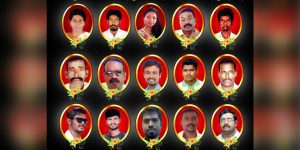
People killed in the 2018 Thoothukudi police firing, as remembered by the Anti-Sterlite People’s Movement. (Supplied)
The plant was permanently shut down by the Tamil Nadu government on 28 May 2018, under Section 18(1)(b) of the Water Act, 1974, after a series of protests and police firing that killed 12. A woman was killed in a related violence later.
The Madras High Court upheld the plant’s closure in 2020, and in March 2024, the Supreme Court dismissed Vedanta’s plea to reopen the plant, citing repeated environmental violations.
The agitation peaked in May 2018, culminating on 22 May when thousands marched towards the Thoothukudi Collector’s office. In the violence that ensued, police opened fire. Hundreds were injured in the assault. Two of them later succumbed to their injuries.
Till today, the case continues to be heard in the Madras High Court and the Supreme Court. Yet, no district collector, government official, or police officer connected to the incident has ever been arrested or made accountable. Instead, they were transferred to other postings — some even received promotions.
The AIADMK was in power in Tamil Nadu, with Edappadi K Palaniswami serving as Chief Minister, when the police opened fire. His statement that he “did not order the firing” and “only came to know about the whole incident by watching television” had triggered widespread controversy.
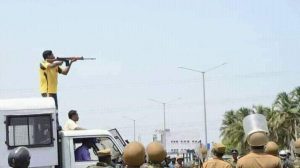
A policeman in plainclothes aims a rifle at anti-Sterlite plant protestors in Thoothukudi in May 2018 (Supplied)
Beyond this, lawyer Vanchinathan — who was at the forefront of the agitation — recalled that 273 cases were filed after the firing. He said that all these cases were later consolidated into a single case by the Supreme Court.
In August 2018, on the orders of the Madras High Court, the investigation was transferred from the CBCID to the CBI.
Hundreds of protesters were charged; many individuals had multiple cases filed against them. Lawyer Vanchinathan faced 32 cases. In its third chargesheet, the CBI filed cases against 101 protesters. Only one police officer — Inspector Thirumalai — was named as an accused. No other police officials or government officers were included.
Inspector Thirumalai was accused of detaining and torturing 94 youths to prevent them from joining the protest. However, no action was taken against those who opened fire, or those who ordered the firing, or those who failed to prevent it — despite the Aruna Jagadeesan Commission explicitly naming them.
Lawyers appearing in the case pointed out that proceedings were still ongoing before the Madras High Court and the Supreme Court.
On 23 May 2018, Justice Aruna Jagadeesan was appointed to head a Commission of Inquiry into the firing. The Commission submitted its final report to the Tamil Nadu government on 18 May 2022.
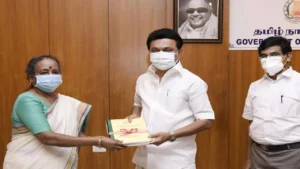
Picture from 14 May, 2021 when the Aruna Jagadeesan Commission of Inquiry submitted its interim report to CM MK Stalin. The final report was submitted on 18 May, 2022. (Supplied)
The report concluded that the police had exceeded their limits and acted with blatant excess. It recommended that the legal heirs of those killed in the firing be compensated with ₹50 lakh each, among several other crucial measures.
The Commission held a total of 17 police officers severally accountable for the Thoothukudi firing of 22 May 2018.
Those named included senior officers such as IG Shailesh Kumar Yadav, DIG Kapil Kumar C. Saratkar, and SP P Mahendran, along with DSP Lingathirumaran, Inspectors Thirumalai, Hariharan, and Parthiban, Sub-Inspectors Sornamani and Rennes, as well as constables and a head constable: Raja, Shankar, Sudalaikannu, Thandavamurthy, Satheesh Kumar, A. Raja, M. Kannan, and Mathivanan.
The Commission recommended department-level action against the officers for their acts of commission and omission, in addition to the initiation of criminal proceedings where applicable.
The Commission also fixed responsibility on members of the district administration. It pointed to N Venkatesh, then District Collector of Thoothukudi, for failing to anticipate the scale of the protest and not initiating meaningful dialogue with the public, and recommended disciplinary action for dereliction of duty.
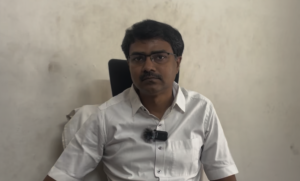
Madurai High Court lawyer Vanchinathan.
Similarly, Vikram Kapur, then Additional Chief Secretary (Industries Department), was held responsible for exerting pressure on the local administration in favour of Sterlite, disregarding mounting public resentment. The panel suggested an enquiry under the service rules against the official.
The report further criticised the conduct of Special Executive Magistrates appointed by the Sub-Collector on 21 May 2018. Specifically named were Sekar, Deputy Tahsildar (Election, Thoothukudi), Chandran, Divisional Excise Officer (Thoothukudi), and Kannan, Zonal Deputy Tahsildar (Thoothukudi).
These officials were accused of leaving their designated jurisdictions without orders and positioning themselves in other areas to suit the police narrative that the firing was lawfully ordered. The Commission described this as a mockery of due process, observing that their presence was manipulated to legitimise police action, and recommended departmental proceedings and other legal action against them.
Importantly, the report noted that the arson on the Collector’s office — cited as justification for the firing — was carried out by a group that had infiltrated the protest, not by the protesters themselves. It was observed that all government agencies had failed to identify these masked individuals.
“Then who are these state agencies protecting, by failing to file new cases and by not implementing the Commission’s recommendations even now?” Vanchinathan asked.
On 29 May 2018, a week after the firing, DMK MLAs entered the Tamil Nadu Assembly dressed in black shirts, led by then Opposition Leader MK Stalin, and staged a walkout demanding justice for the victims.
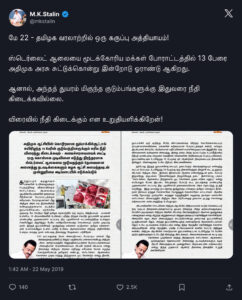
Then opposition leader M.K. Stalin’s tweet
Stalin said that once his party came to power, those who ordered the firing and those who pulled the trigger would be punished. Yet, more than four years after coming to power, not a single official has faced punishment. Seven years have now passed since 13 people were killed, and that remains the striking reality.
Instead of punishment, officials have only received promotions and transfers. For instance:
Similarly, Venkatesh, IAS, is now serving as Special Secretary to the Government in the Finance Department. Yet, “not a single official has even stepped inside a courtroom for this case,” Vanchinathan said. He pointed out that even Inspector Thirumalai — the only officer formally named in the case — has rarely appeared before the court.
Currently, Vanchinathan represents over 40 of the hundred protesters who were named as accused in this case.
In its 2021 election manifesto, the DMK promised — under pledge number 484 — that all “false cases” filed against the public who protested against Sterlite, hydrocarbon, methane, and Kudankulam projects would be withdrawn.
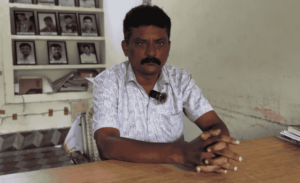
Krishnamoorthy is one of the leaders, who led the anti-Sterlite protest.
On 26 May 2021, soon after taking office, the DMK government withdrew 38 cases, mostly those filed against leaders. The CBI-filed cases remained untouched.
K Kebiston, who runs a fish-related business at the VOC Port in Thoothukudi, said: “There are multiple cases against me. My name is not on the CBI’s list, but I am still stuck with cases filed by the Tamil Nadu government. Because of this, we cannot even apply for a passport.”
He added that more than 80 young men detained at the Vallanadu firing site by Inspector Thirumalai still face cases. This has caused serious hardships. “Some of them work on ships across international waters. But without clearance, they cannot obtain a CDC (Continuous Discharge Certificate). They cannot even go out to sea to fish,” Kebiston said.
“During the protest, many of us who led the agitation were jailed in Palayamkottai and nearby prisons for 30–40 days. Even now, no one knows how to end those cases,” he added.
“Hundreds of people are still fighting these cases. In the chargesheet filed against 101 people, only one is a police officer. Does that mean we attacked ourselves? How can the Tamil Nadu government accept this farcical investigation?” asked Krishnamoorthy, an environmental activist and one of the leaders of the protest.
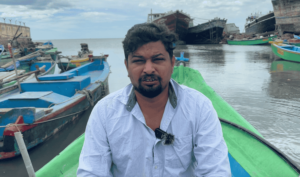
Kebiston.
Notably, on 14 August 2018, Stalin — then Opposition Leader — had welcomed the transfer of the case to the CBI. Yet, the CBI chargesheet ended up implicating almost only the protesters, sparing the officers.
“The DMK said they would give us justice. But what have they done? Many protesters are still listed under ‘rowdy sheets.’ Are we rowdies? We are environmental activists. This government is doing the same as the previous one. What difference is there between you and them?” Krishnamoorthy asked.
Take the case of a young man named Princeton, who lost his right leg in the protest. To this day, he spends thousands of rupees on artificial limbs. Many others like him have lost body parts, jobs, and livelihoods — their futures cut short.
The government has so far paid ₹25 lakh each to the kin of those who died, while the injured received compensation ranging from ₹5 lakh to ₹1 lakh. Families of the deceased were also given government jobs.
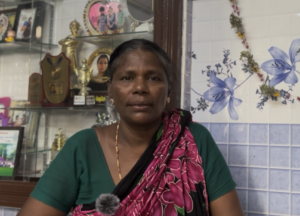
J Vanitha.
The Aruna Jagadeesan Commission’s final report recommended ₹50 lakh for each bereaved family and ₹10 lakh for those who sustained grievous injuries.
Vanitha filed a petition in the Madras High Court in February 2024, demanding that the Commission’s recommendations be implemented and that ₹1 crore be given to each of the 13 families who lost their loved ones.
In response, the government argued that since ₹25 lakh had already been paid and jobs offered to the kin, the enhanced compensation of ₹1 crore could not be considered a “justifiable grievance.”
This stands in stark contrast to Stalin’s own words as Opposition Leader. On 27 May 2018, he had issued a statement demanding that “from the ₹100 crore fine imposed by the Supreme Court on Sterlite, and its accrued interest, the families of the 13 killed in the firing should each be given ₹1 crore, and financial assistance should also be provided to families affected by disease and environmental harm.”
Demands of the Sterlite protesters
After years of struggle to shut down the Sterlite plant, those who fought the battle now put forward five key demands:
(Edited by Majnu Babu).
